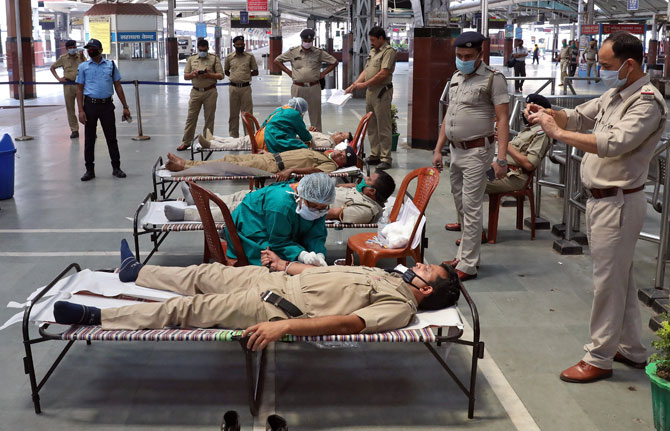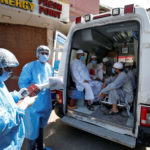In South Asia, the World Bank also approved $200 million for Pakistan, $100 million for Afghanistan, $7.3 million for the Maldives and $128.6 million for Sri Lanka.
IMAGE: Railway police officers donate blood at a camp to tackle the blood shortage during a 21-day nationwide lockdown to slow the spreading of the coronavirus at the closed Howrah railway station in Kolkata. Photograph: Rupak De Chowdhuri/Reuters
The World Bank has approved $1 billion emergency funding for India to help it tackle the coronavirus pandemic, which has claimed 76 lives and infected 2,500 people in the country.
The World Bank’s first set of aid projects, amounting to $1.9 billion, will assist 25 countries, and new operations are moving forward in over 40 nations using the fast-track process, the bank said on Thursday.
The largest chunk of the emergency financial assistance has gone to India.
“In India, $1 billion emergency financing will support better screening, contact tracing, and laboratory diagnostics; procure personal protective equipment; and set up new isolation wards,” the World Bank said after its Board of Executive Directors approved the first set of emergency support operations for developing countries around the world, using a dedicated, fast-track facility for COVID-19 response.
In South Asia, the World Bank also approved $200 million for Pakistan, $100 million for Afghanistan, $7.3 million for the Maldives and $128.6 million for Sri Lanka.
The World Bank said it was now working to grant up to $160 billion over the next 15 months to support measures to tackle the pandemic which will focus on the immediate health consequences and bolster economic recovery.
The broader economic program will aim to shorten the time to recovery, create conditions for growth, support small and medium enterprises, and help protect the poor and vulnerable.
There will be a strong poverty focus in these operations, with an emphasis on policy-based financing, and protecting the poorest households and the environment, it said.
“The World Bank Group is taking broad, fast action to reduce the spread of COVID-19 and we already have health response operations moving forward in over 65 countries,” said World Bank Group President David Malpass.
“We are working to strengthen (the) developing nations’ ability to respond to the COVID-19 pandemic and shorten the time to economic and social recovery. The poorest and most vulnerable countries will likely be hit the hardest, and our teams around the world remain focused on country-level and regional solutions to address the ongoing crisis,” Malpass said.
According to the bank, $100 million will support Afghanistan to slow and limit the spread of COVID-19 through enhanced detection, surveillance, and laboratory systems, as well as strengthen essential health care delivery and intensive care.
In Pakistan, $200 million will support preparedness and emergency response in the health sector and include social protection and education measures to help the poor and vulnerable cope with the immediate impacts of the pandemic, the bank said.
Responding to widespread supply chain disruptions, the World Bank is helping countries access critically needed medical supplies by reaching out to suppliers on behalf of the governments.
The World Bank is encouraging others to provide financial support to developing countries for the COVID-19 health response, said the media statement.
A total of 1,002,159 COVID-19 cases have been reported across more than 175 countries and territories with 51,485 deaths reported so far, according to Johns Hopkins University data.




